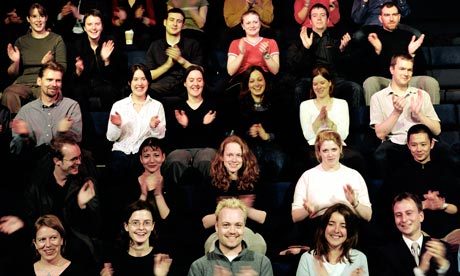T.C. Boyle once said that "Most writers are writers because they are introverts who have chosen a profession in which they don't have to deal with anyone." While it may be painful for them to be out in the public eye, it shouldn't be painful for people to listen to them read from their books -- but all too often, it is.
Here are five simple tools authors can use to become skilled at this essential side of the profession.
Get director's notes from someone tough but fair. A reading is a performance. Don't ever forget that you're entertaining an audience and interacting with it. You need to see yourself as onstage, and that means getting somebody you trust to give you honest feedback from more than one reading. What's your pacing like? Are you stopping at the right points? Is your voice under control? Are you pushing too hard or holding back? Does the reading flow naturally or does it seem staged and forced? How's your diction? Do you project enough? Every detail counts.
Have yourself filmed, then watch and listen for physical and verbal tics. It can be awkward or even distressing to study yourself, but it's vital. You need to discover whether you touch your hair too much or scratch or gesture too broadly or smile at the wrong times, or look grim, or keep saying "umm" or if there's anything you do that might distract or bore an audience. A voice recording will also help you immensely, and be prepared to dislike the sound of your own voice and feel self-conscious at first. Most people do. You'll get over it, just as you can eliminate your tics.
Be completely familiar with your work. Eye contact is a major part of a reading -- you do not want to keep your eyes down on the text too much. What's duller than an author who mumbles and doesn't look at the audience? I had a friend who read the same short story from her first book at every reading for more than a year and had basically memorized it. She could do it differently each time because she had it down cold and could work each of her audiences, interacting with them and feeding off the particular energy of that evening.
Time your reading. This is especially crucial if you're doing an event with one or two other writers. Don't be a hog! You risk annoying your audience and the other writers if you exceed your allotted time, and you'll make listeners squirm. Even when you're on your own, less is always more. If someone gives you half an hour, don't plan material that lasts that long. Go for twenty instead. That gives you more room to maneuver within your text and slow down. Reading a shorter selection also allows more time for Q&A where you get to share the stage and give the audience a different way of getting to know you.
Never apologize. That's a sign of weakness as Gibbs says on NCIS. Don't be overly deferential or self-deprecating. Don't say anything about the difficulties you had choosing what to read, or say what you're reading may be hard to follow, or that you're new at this, or you're not as good as the previous reader, or do anything else to undermine your own authority as the focus of people's attention. If you're not comfortable doing the reading, your audience won't be, either. Confidence is not the same as arrogance.
When I went on my first tour, I was lucky because I started with some basic advantages. I was an extrovert. I had acted in college and was comfortable with an audience. I also had years of teaching experience and every teacher knows that's like doing a one-man show each and every class. But despite all that, I had never read my own work to an audience, and it demanded a total reorientation. I had to learn new skills while honing old ones. And now, even though I've been doing readings for over twenty years, I know I can still keep perfecting my craft. We all can. It's not magic. It's work.
Lev Raphael has done hundreds of readings from his books on three different continents--and in more than one language. He's the author of Writer's Block is Bunk (A Guide for Writers) and 24 other books in genres from memoir to mystery. You can check them out on Amazon here.


